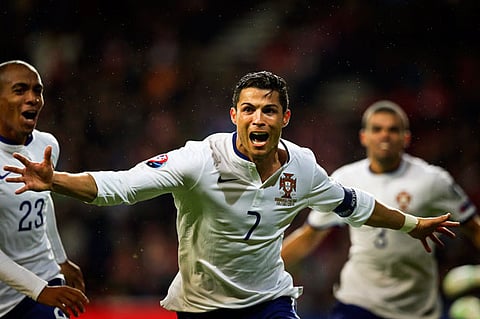What's in store for this year's Euro 2016?
With no clear favourites, the tournament promises to showcase an enthralling month of top-class action

There is a commonly-held view among the football elite that the European Championship or the Euro, as it is more popularly known, is more competitive than the World Cup itself. With 16 of the best European teams facing off against each other, many believed it was a much tougher competition to win than the global event which features 32 teams, some of them relatively weaker football-playing nations from across six continents.
But that argument falls flat in the latest edition of the event to be held in France from June 10 to July 10, one that will see 24 teams instead of the usual 16, spread across six groups of four teams each with the top two and the four best third-placed teams progressing to the knockout stages.
Not ideal
Former Uefa general secretary and current Fifa president Gianni Infantino had described the format as "not ideal" due to the need for third-ranked teams in the group stage advancing, leading to a difficulty in preventing situations where teams might be able to know in advance what results they need to progress out of the group, leading to a lack of suspense for fans, or even the prospect of mutually beneficial collusion between teams.
Whether that eventually transpires or not, one needs to wait and see, but the increase in the number of teams has meant that there will be quite a few first-timers in France. Albania, Iceland, Northern Ireland, Slovakia and Wales make their maiden trip to the Euro, hoping to cause a few upsets and show that they are not there to just make up the numbers.
Most of the European powerhouses have made it without breaking much sweat. Thirteen of the 16 teams (including hosts France) who qualified for the previous edition in 2012 have qualified again this time. Among them are England who became only the sixth team to record a flawless qualifying campaign (10 wins in 10 matches), defending European champions Spain and world champions Germany, who qualified for their 12th straight Euro.
Absent this year
But there are some notable absentees as well. Scotland are the only team from the British Isles not to qualify and 2004 champions Greece finished bottom of their qualifying group. Two other previous Euro champions, 1988 winners the Netherlands and 1992 titlists Denmark, both missed out. The Netherlands failed to qualify for the first time since Euro 1984 (also held in France), and missed out on their first major tournament since the 2002 World Cup and Denmark for the first time since Euro 2008, after losing in the play-off rounds to Sweden.
Among the nations who are making a return to the tournament after missing out in 2012 are Romania, Turkey, Austria and Switzerland, with the Austrians qualifying for just their second Euro, after having co-hosted the 2008 edition. Also returning to the tournament after long absences are Belgium for the first time since co-hosting Euro 2000 and Hungary for the first time in 44 years, having last appeared at Euro 1972 and 30 years since appearing in a major tournament, their previous one being the 1986 World Cup.
With only the top two teams guaranteed a passage into the last 16 from the six groups, the ‘Group of Death’ looks to be Group E featuring Belgium, Italy, Republic of Ireland and Sweden. France and Germany seem to have it the easiest in their respective groups. In Group A, the hosts, who are also the 1998 and 2000 Euro champions, besides being the 1998 World Cup winners, take on Romania, Albania and Switzerland and if the French can focus on the task at hand, this talented bunch should progress well past the group stage.
Group C sees the three-time European and four-time World Cup champions Germany up against Ukraine, Poland and Northern Ireland in what looks to be a cakewalk to the knockout stages for them.
Perennial under-achievers England have been clubbed with Russia, neighbours Wales and Slovakia in Group B. Since winning the World Cup in 1966, the country boasting the most popular league in the world have always flattered to deceive in the big tournaments and nothing suggests that things are about to change soon.
Defending champions Spain find themselves in a tricky Group D alongside the Czech Republic, Turkey and Croatia, while Group F is possibly the least talked-about of all groups and features Portugal, Iceland, Austria and Hungary.
So the stage is all set to get the ball rolling with hosts France opening proceedings against Romania at the Stade de France, one among the 10 stadiums to be used, on June 10 and with no clear favourites this time around, the tournament promises to showcase an enthralling month of top-class action.



